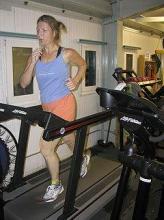More rigorous and/or more frequent exercise was associated with a significantly reduced risk of cardiovascular events in women with nonmetastatic breast cancer, regardless of age and type of anticancer therapy received, investigators reported.
“CVD [Cardiovascular disease] is now the leading cause of death among women with nonmetastatic breast cancer, especially for those older than 65 years of age and with preexisting CVD risk factors (eg., hypertension, obesity, history of cardiovascular disease) at diagnosis. Moreover, patients with nonmetastatic breast cancer may be at increased risk of CVD, compared with age-matched women without a history of breast cancer because of the direct toxic effects of anticancer therapy,” wrote Dr. Lee Jones of the Memorial Sloan Kettering Cancer Center, New York, and associates (J Clin Oncol. 2016 May 23. doi: 10.1200/JCO.2015.65.6603).
To see whether exercise reduces risk, investigators gave the Arizona Activity Frequency Questionnaire to 2,973 women diagnosed with nonmetastatic breast cancer who were participating in two cohort studies. Frequency, duration, and type of exercise were standardized into metabolic equivalent tasks (MET), which were quartiled into the following categories: less than or equal to 2 h/wk, 2.1-10.3 h/wk, 10.4-24.5 h/wk, and greater than 24.6 h/wk. Cardiovascular events, defined as coronary artery disease, nonfatal myocardial infarction, heart failure, valve abnormality, arrhythmia, stroke or cardiovascular disease–related death, were monitored via electronic medical records.
Median follow-up time was 8.6 years. In age-adjusted analysis, the risk of cardiovascular events declined across increasing quartiles of total MET h/wk (1.00, 0.83, 0.72, 0.57, respectively, P less than .001).
Adherence to national exercise guidelines for adult patients (MET score equal to or greater than 9) was associated with a significant 23% reduction in cardiovascular events. Patients who met the national exercise guidelines had a significant reduction in cardiovascular events regardless of age, menopausal status, type of anticancer therapy, or cardiovascular risk factors at cancer diagnosis when compared with patients who not did meet the national exercise guidelines.
“Irrespective of therapy-induced risk, CVD will remain a leading cause of mortality in early-stage breast cancer given continual improvements in cancer-specific mortality together with the rapidly aging population. Thus, our finding that the cardioprotective effects of exercise are comparable in middle-aged women irrespective of exposure to anticancer therapies is novel and important. … Nevertheless, at present, at least in the United States, exercise treatment is not considered an aspect of first-line therapy for the adverse CV consequences of breast cancer adjuvant therapy, similar to that for the primary or secondary prevention of CVD. As such, confirmatory data from randomized trials are urgently required,” the investigators wrote.
This study was supported by a National Institute of Health Award and research grants from the National Cancer Institute and the Memorial Sloan Kettering Cancer Center. One investigator reported having stock or ownership interests in Exercise by Science. Two investigators reported serving in advisory roles or receiving financial compensation from various companies. The other investigators reported having no disclosures.
On Twitter @JessCraig_OP


